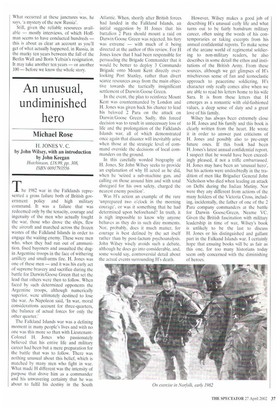An unusual, undiminished hero
Michael Rose
H. JONES V. C. by John Wilsey, with an introduction by John Keegan Hutchinson, £18.99, pp. 308, ISBN 0091793556 The 1982 war in the Falklands represented a gross failure both of British government policy and high military command. It was a failure that was redeemed only by the tenacity, courage and ingenuity of the men who actually fought the war, those who drove the ships, flew the aircraft and marched across the frozen wastes of the Falkland Islands in order to engage the waiting enemy. These were men who, when they had run out of ammunition, fixed bayonets and assaulted the dugin Argentine troops in the face of withering artillery and small-arms fire. H. Jones was one of these men — and it was his early act of supreme bravery and sacrifice during the battle for Darwin/Goose Green that set the lead that others were then to follow. When faced by such determined opponents the Argentine troops, although numerically superior, were ultimately destined to lose the war. As Napoleon said, `In war, moral considerations account for three-quarters, the balance of actual forces for only the other quarter.'
The Falkland Islands war was a defining moment in many people's lives and with no one was this more so than with Lieu tenantColonel H. Jones who passionately believed that his entire life and military career had been but a mere preparation for the battle that was to follow. There was nothing unusual about this belief, which is matched by many men who fight in war. What made H different was the intensity of purpose that drove him as a commander and his unwavering certainty that he was about to fulfil his destiny in the South Atlantic. When, shortly after British forces had landed in the Falkland Islands, an initial suggestion by H Jones that his battalion 2 Para should mount a raid on Darwin/Goose Green was rejected, his fury was extreme — with much of it being directed at the author of this review. For H Jones knew that I had been responsible for persuading the Brigade Commander that it would be better to deploy 3 Commando Brigade onto Mount Kent directly overlooking Port Stanley, rather than divert scarce resources away from the main objective towards the tactically insignificant settlement of Darwin/Goose Green.
In the event, the plan to reinforce Mount Kent was countermanded by London and H. Jones was given back his chance to lead his beloved 2 Para on the attack on Darwin/Goose Green. Sadly, this forced decision was to result in unnecessary loss of life and the prolongation of the Falklands Islands war, all of which demonstrated once again that disaster will inevitably arise when those at the strategic level of command override the decisions of local commanders on the ground.
In this carefully worded biography of H. Jones, Sir John Wilsey seeks to provide an explanation of why H acted as he did, when he 'seized a sub-machine gun, and calling on those around him and with total disregard for his own safety, charged the nearest enemy position'.
Was H's action an example of the rare 'unprepared two o'clock in the morning courage', or was it something that he had determined upon beforehand? In truth, it is nigh impossible to know why anyone behaves as they do in such dire moments. Nor, probably, does it much matter, for courage is best defined by the act itself rather than by post-factum psychoanalysis. John Wilsey wisely avoids such a debate, although he does go into considerable, and, some would say, controversial detail about the actual events surrounding H's death. However, Wilsey makes a good job of describing H's unusual early life and what turns out to be fairly humdrum military career, often using the words of his contemporaries or taking excerpts from his annual confidential reports. To make sense of the arcane world of regimental soldiering to non-military readers, he also describes in some detail the ethos and institutions of the British Army. From these sources, although we get glimpses of H's mischievous sense of fun and iconoclastic approach to peacetime soldiering, H's character only really comes alive when we are able to read his letters home to his wife Sara. It is from these letters that H emerges as a romantic with old-fashioned values, a deep sense of duty and a great love of his family.
Wilsey has always been extremely close to H. Jones and his family and this book is clearly written from the heart. He wrote it in order to answer past criticisms of H. Jones and possibly also to pre-empt future ones. If this book had been H. Jones's latest annual confidential report, I suspect that he would have been exceedingly pleased, if not a trifle embarrassed, H. Jones may have been an 'unusual hero', but his actions were undoubtedly in the tradition of men like Brigadier General John Nicholson who died when leading an attack on Delhi during the Indian Mutiny. Nor were they any different from actions of the many holders of the Victoria Cross, including, incidentally, the father of one of the 2 Para company commanders at the battle for Darwin Goose/Green, Neame VC. Given the British fascination with military leadership in time of war, Wilsey's book is unlikely to be the last to discuss H. Jones or his distinguished and gallant part in the Falkand Islands war. I certainly hope that ensuing books will be as fair as this one, for too many historians today seem only concerned with the diminishing of heroes.


































































 Previous page
Previous page